 Petzlover
Petzlover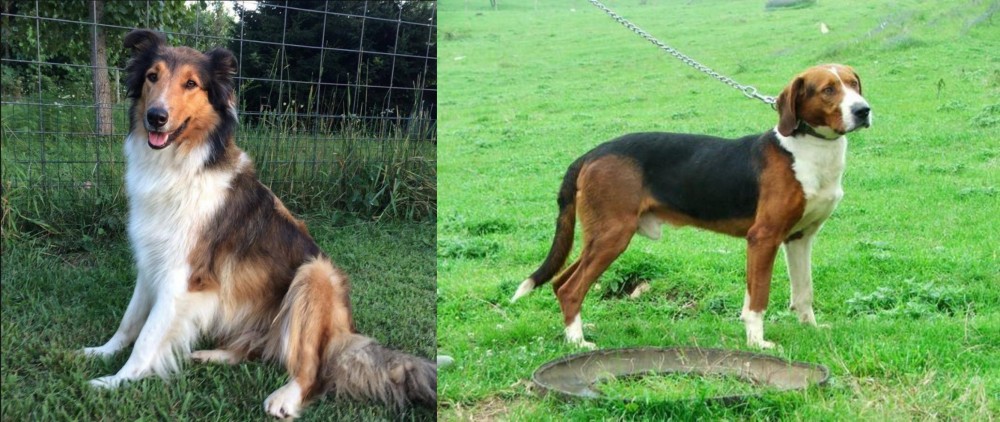 Scotch Collie is originated from United Kingdom but Serbian Tricolour Hound is originated from Croatia. Scotch Collie may grow 6 cm / 3 inches higher than Serbian Tricolour Hound. Scotch Collie may weigh 7 kg / 16 pounds more than Serbian Tricolour Hound. Both Scotch Collie and Serbian Tricolour Hound has almost same life span. Both Scotch Collie and Serbian Tricolour Hound has almost same litter size. Scotch Collie requires Moderate Maintenance. But Serbian Tricolour Hound requires Low Maintenance
Scotch Collie is originated from United Kingdom but Serbian Tricolour Hound is originated from Croatia. Scotch Collie may grow 6 cm / 3 inches higher than Serbian Tricolour Hound. Scotch Collie may weigh 7 kg / 16 pounds more than Serbian Tricolour Hound. Both Scotch Collie and Serbian Tricolour Hound has almost same life span. Both Scotch Collie and Serbian Tricolour Hound has almost same litter size. Scotch Collie requires Moderate Maintenance. But Serbian Tricolour Hound requires Low Maintenance
 The landrace breed, which started in the highlands of Scotland is known as the Scotch Collie. There were at the time two types of collies – the Rough or long haired collie and the smooth or short haired collie. The Scotch Collie is considered to be from a line of very ancient herding dogs. It might have existed in the days of the Roman Empire, these herding dogs might have included the Native Celtic Dogs, Roman Cattle Dogs, Gordon Setter, Viking Herding Spitzes and Irish Setters.
The landrace breed, which started in the highlands of Scotland is known as the Scotch Collie. There were at the time two types of collies – the Rough or long haired collie and the smooth or short haired collie. The Scotch Collie is considered to be from a line of very ancient herding dogs. It might have existed in the days of the Roman Empire, these herding dogs might have included the Native Celtic Dogs, Roman Cattle Dogs, Gordon Setter, Viking Herding Spitzes and Irish Setters.
In its native land the Scotch Collie is often called the colley dogs, coaly and cooley. Collie comes from the Scottish words for black coal – or the Coaley Sheep they herded. In addition to herding, the Scotch Collie also acted as a hunter and guard dog for its family. A large group of these collies were exported to America to work on family farms. Soon they were so popular they became family pets. They were first shown in both England and America in in the mid to late 1800’s.
The Scotch Collie Club was formed in 1885 and the breed accepted into the AKC the same year. The Collie Club of America started the following year. The AKC eventually dropped the moniker Scotch in favor or Rough and Smooth Collie. This move also separated the show dogs from the still working/herding Scotch Collies.
Aa time went on and the collie became more prominent in conformation competitions, some breeders mixed in the Greyhound and perhaps the Borzoi to get the collie we see today. The Scotch Collie itself eventually lost its independent recognition in the UKC and the NKC. It was mixed in with the English Shepard, but it was an important element in the development of the Australian Shepard, Shetland Sheepdogs and Border Collies.
The breed had a revival of sorts in the early 2000’s as the Old Time Scotch Collie. Any type of farm collie in America and Canada can be registered in the OTSCA. They are more often referred to as Old Time Farm Shepherds to avoid confusion them with the very popular collies. In 2017 there were 174 of these OTSCA dogs. Collies today have less working instincts, and the heeling instinct seems to be gone.
Today the show version of the Scotch Collie is recognized by both the AKC and UKC in the herding group.
It has been said of the Scotch Collie that they have “the majesty of a lion, the pride of a great thoroughbred stallion, the confidence of a Winston Churchill.”
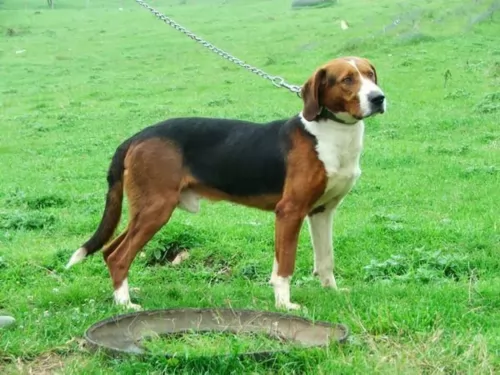 The Serbian Tricolour Hound was once known as the Yugoslavian Tricolour Hound. It’s a rare dog breed that you won’t find much outside of the Balkans.
The Serbian Tricolour Hound was once known as the Yugoslavian Tricolour Hound. It’s a rare dog breed that you won’t find much outside of the Balkans.
These dogs were bred for hunting in packs but in these more modern times they are more of a companion dog.
It is thought that the Serbian Tricolour Hound was a variant of the Serbian Hound until 1946 when a separate breed standard was established. It was recognized by the Federation Cynologique Internationale in 1961.
 This Scotch Collie is an athletic, intelligent, well-balanced and alert dog. This collie has no exaggerated features like the long nose/muzzle of the current collies. This Scotch Collie is sound in mind and body, a hard working dog. He is hearty and versatile. They are longer than they are tall. Their heads are moderate and the stoop is well defined. They have a wide, flat skull. Their lips are tight and they are fitted well.
This Scotch Collie is an athletic, intelligent, well-balanced and alert dog. This collie has no exaggerated features like the long nose/muzzle of the current collies. This Scotch Collie is sound in mind and body, a hard working dog. He is hearty and versatile. They are longer than they are tall. Their heads are moderate and the stoop is well defined. They have a wide, flat skull. Their lips are tight and they are fitted well.
Their ears are also moderate in size and pointed or partially erect. They should not have long or droopy ears. They have eyes that might be oblique, almond, and round. The eyes are usually brown and merles may have blue eyes. The breed has a deep chest, broad shoulders and a long tail. There are also some bobtails that occur naturally.
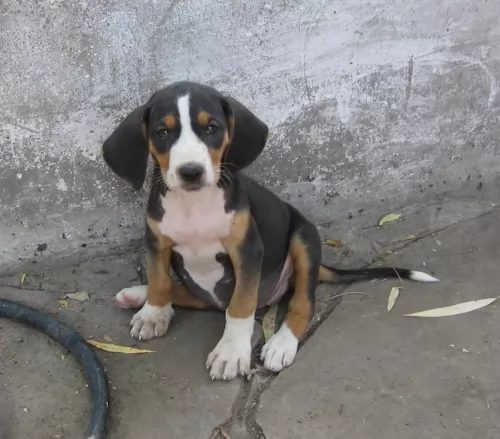 The Serbian Tricolour Hound is a medium sized dog standing at between 44 to 55cm in height and weighing in the region of 20 to 25kg.
The Serbian Tricolour Hound is a medium sized dog standing at between 44 to 55cm in height and weighing in the region of 20 to 25kg.
He is a strong, muscular, solidly built dog with a rounded skull and longish muzzle. The ears of this dog are long and floppy and the long, curved tail hangs down but is held high when the dog is excited.The dog has a short, glossy coat which is essentially a rusty color. There is quite a lot of black with some white on the coat too.
Loving and loyal, this dog was once used for hunting and he has learned to listen carefully to- and respond well to his owner.
He loves his human family and makes a great family pet. He gets on well with the kids, loving to take part in their games. He is intelligent and with training and socialization he is obedient, well balanced and well mannered.
Friendly and social, all he wants is to be with his human family, but even so he is better suited to life with a family who lives on a large property in the suburbs or countryside as opposed to living in the city.
 3.Adaptability - Scotch Collies are versatile and adaptable. There is no need to crate them as they are not destructive. If you have a large run or kennel, they can live anywhere. However they are happiest on farms and open lands.
3.Adaptability - Scotch Collies are versatile and adaptable. There is no need to crate them as they are not destructive. If you have a large run or kennel, they can live anywhere. However they are happiest on farms and open lands.
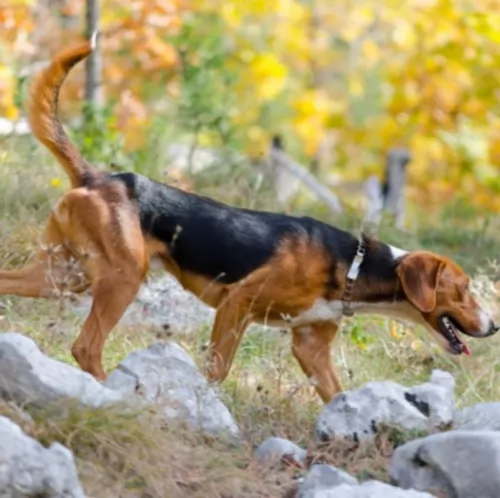 The Serbian Tricolour Hound is a loving, loyal, active, devoted breed that loves his human family, wanting to be involved in all the activities they’re involved in.
The Serbian Tricolour Hound is a loving, loyal, active, devoted breed that loves his human family, wanting to be involved in all the activities they’re involved in.
He is somewhat reserved with strangers but training and socialization helps to make him well behaved around them and it means you can take him with you wherever you go as he is well behaved.
These Serbian dogs make splendid pets, and if you take good care of yours, he will provide you with unconditional love.
 The old line breed was hearty with few health issues. The ones they did have included:
The old line breed was hearty with few health issues. The ones they did have included:
• Skin problems - can have skin diseases like mange that may or may not be acute, may have allergies or sensitivities.
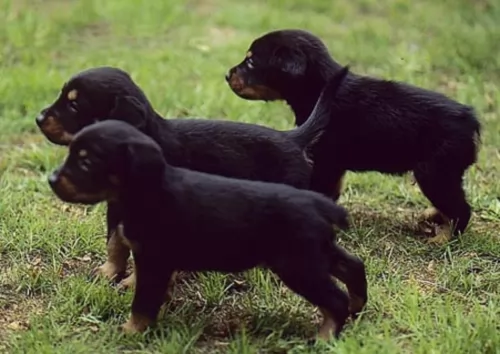 The Serbian Tricolour Hound is such a healthy dog breed and with the right nutrition and exercise can reach 12 to 15 years of age. He is a rare dog breed so there isn’t a whole lot of information available about his health.
The Serbian Tricolour Hound is such a healthy dog breed and with the right nutrition and exercise can reach 12 to 15 years of age. He is a rare dog breed so there isn’t a whole lot of information available about his health.
There are always going to be those common dog illnesses that many dogs succumb to. Some of them are hip dysplasia, cancer, skin problems and parasites.
With his floppy ears, check out the insides of his ears to ensure there are no signs of redness and ear discharge.
Hip dysplasia is a condition where parts of the hip joints don’t fit properly together. This creates a situation where there is abnormal wear and tear on the joints. It can lead to arthritis even and pain for your dog.
The tapeworm is a parasite spread to dogs but also to people and it is through the ingestion of infected fleas. You can often detect this when you discover parts of the worm crawling in your dog’s bowel movements.
Check your dog over for ticks and fleas too when you brush him as these can lead to other illnesses such as tick bite fever.
 1Feeding the puppy - The Scotch Collie is not a medium dog nor is it a large dog. It is somewhere in-between. Because of this there is some discretion in not only how much you feed your puppy, but also what you feed. Normally we would feed according to breed size but here you need a high quality formula that is made for working breeds. The puppy will need enough calories to meet their high energy needs. Feed at least 3-4 times a day.
1Feeding the puppy - The Scotch Collie is not a medium dog nor is it a large dog. It is somewhere in-between. Because of this there is some discretion in not only how much you feed your puppy, but also what you feed. Normally we would feed according to breed size but here you need a high quality formula that is made for working breeds. The puppy will need enough calories to meet their high energy needs. Feed at least 3-4 times a day.
2.Feeding the adult - you need a high quality formula that is made for working breeds. The adult will need enough calories to meet their high energy needs. Feed at least 2 times a day.
There is a high need for exercise starting with walks or jog but that is not going to be enough. The Scotch Collie is not a Border Collie or a Corgi in terms of energy, but they are not couch potaoes. They need more than access to a yard. They need a job or they need defined exercise and play. The daily walk or jog will do it but intense play is better.
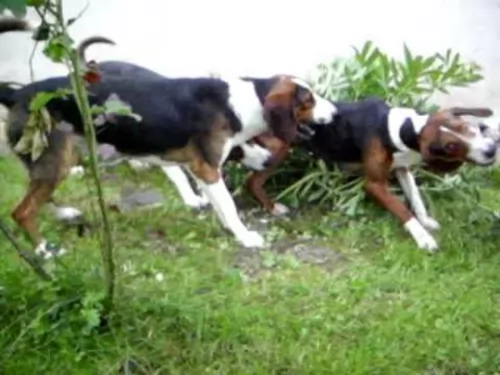 The short, shiny coat of the Serbian Tricolor Hound will require nothing more than a good brush twice a week to keep the coat nice and smooth. You can even take a damp cloth and wipe the coat over with it to remove dust.
The short, shiny coat of the Serbian Tricolor Hound will require nothing more than a good brush twice a week to keep the coat nice and smooth. You can even take a damp cloth and wipe the coat over with it to remove dust.
Provide your dog with a regular amount of exercise every day. Dogs become sad and unhealthy when they’re just stuck in the back yard and left on their own. Take him for walks each day and throw a ball for him to fetch. Simple little games like this will keep him happy as he loves to spend time with you.
Only the very best food is good enough for a dog. Dry kibble is excellent and convenient but try and feed your dog some home-made food too. Avoid spicy, exotic foods as this can upset your dog’s digestive system. Speak to your vet if you’re unsure how to feed your dog to ensure his good health and longevity.